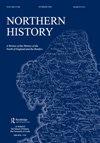彼得·柯林斯和路易斯·法尔西尼(编),《供养穷人:旧穷人法》,1750–1834
IF 0.2
3区 历史学
Q2 HISTORY
引用次数: 1
摘要
这种真正的恐惧是由宣传引起的宣传集中在未开化的苏格兰高地人以及惩罚性天主教回归英国海岸这深深渗透到英国公众意识中。尽管奥茨从汉诺威的角度看待詹姆斯二世党,但他的研究确实表明,詹姆斯二世党不只是“杂耍”,而是威胁到成千上万普通英国人所持有的英国核心价值观和传统的核心问题。与最近的詹姆斯二世党史学一致,这项工作表明,詹姆斯二世党叛乱是18世纪英国历史上的重要事件。然而,对于詹姆斯二世党学者来说,最重要的是,这部作品凸显了詹姆斯二世党未能赢得英国人民的心。对我来说,这是这本书最重要的方面。甚至当詹姆斯二世党人在15年进入普雷斯顿或在45年占领卡莱尔的守军时也有许多抵抗和拒绝服从詹姆斯二世党人命令的行为。即使人们服从,也通常是在胁迫之下。从奥茨通过大量档案研究发现的证据来看,从苏塞克斯到纽卡斯尔,从多塞特到约克,英国人对詹姆斯党持压倒性的负面态度。因此,即使查理·爱德华·斯图亚特和他的军队选择继续向伦敦前进,斯图亚特王朝是否能恢复也是值得怀疑的。正如本卷中许多同时代的资料所强调的那样,一场全面的内战更有可能发生。这本书显示了在1715年和1745年詹姆斯二世党叛乱期间,汉诺威政权在英国得到广泛支持。然而,其潜在的主题和结论更为重要,因为它们为英国人民、詹姆斯比主义和汉诺威政府之间的关系提供了新的视角。本文章由计算机程序翻译,如有差异,请以英文原文为准。
PETER COLLINGE and LOUISE FALCINI (eds), Providing for the Poor: The Old Poor Law, 1750–1834
This genuine fear was stirred by propaganda which focused on the uncivilised Scottish Highlander and the return of punitive Catholicism to British shores which seeped deep into the English public consciousness. Even though Oates looks at the Jacobites through an English Hanoverian lens, his work does show that Jacobitism was not just ‘a sideshow’ but was a central concern which threatened the core British values and traditions held by thousands of ordinary English people. In line with recent Jacobite historiography this work shows that the Jacobite rebellions are significant events in eighteenth century British history. However, most importantly for Jacobite scholars, this work highlights the failure of the Jacobites to win the hearts and minds of the English people. This, for me, is the most significant aspect of the book. Even when the Jacobites entered Preston in the ‘15 or took over the garrison of Carlisle in the ‘45 there were numerous acts of resistance and refusals to comply with Jacobite orders. Where people did comply, it was usually under duress. Judging by the evidence that Oates has uncovered through vast archival research it shows that the English people had an overwhelmingly negative attitude towards the Jacobites, from Sussex to Newcastle and from Dorset to York. Therefore, even if Charles Edward Stuart and his army had chosen to continue onwards towards London, it is doubtful whether the Stuarts would have been restored at all. As many of the contemporary sources in this volume highlight, a fullblown civil war would have been more likely. This book shows widespread support for the Hanoverian regime across England during the 1715 and 1745 Jacobite rebellions. However, its underlying themes and conclusions are far more important as they provide new perspectives on the relationship between the English people, Jacobitism and the Hanoverian state.
求助全文
通过发布文献求助,成功后即可免费获取论文全文。
去求助
来源期刊

Northern History
Multiple-
CiteScore
0.20
自引率
33.30%
发文量
37
期刊介绍:
Northern History was the first regional historical journal. Produced since 1966 under the auspices of the School of History, University of Leeds, its purpose is to publish scholarly work on the history of the seven historic Northern counties of England: Cheshire, Cumberland, Durham, Lancashire, Northumberland, Westmorland and Yorkshire. Since it was launched it has always been a refereed journal, attracting articles on Northern subjects from historians in many parts of the world.
 求助内容:
求助内容: 应助结果提醒方式:
应助结果提醒方式:


